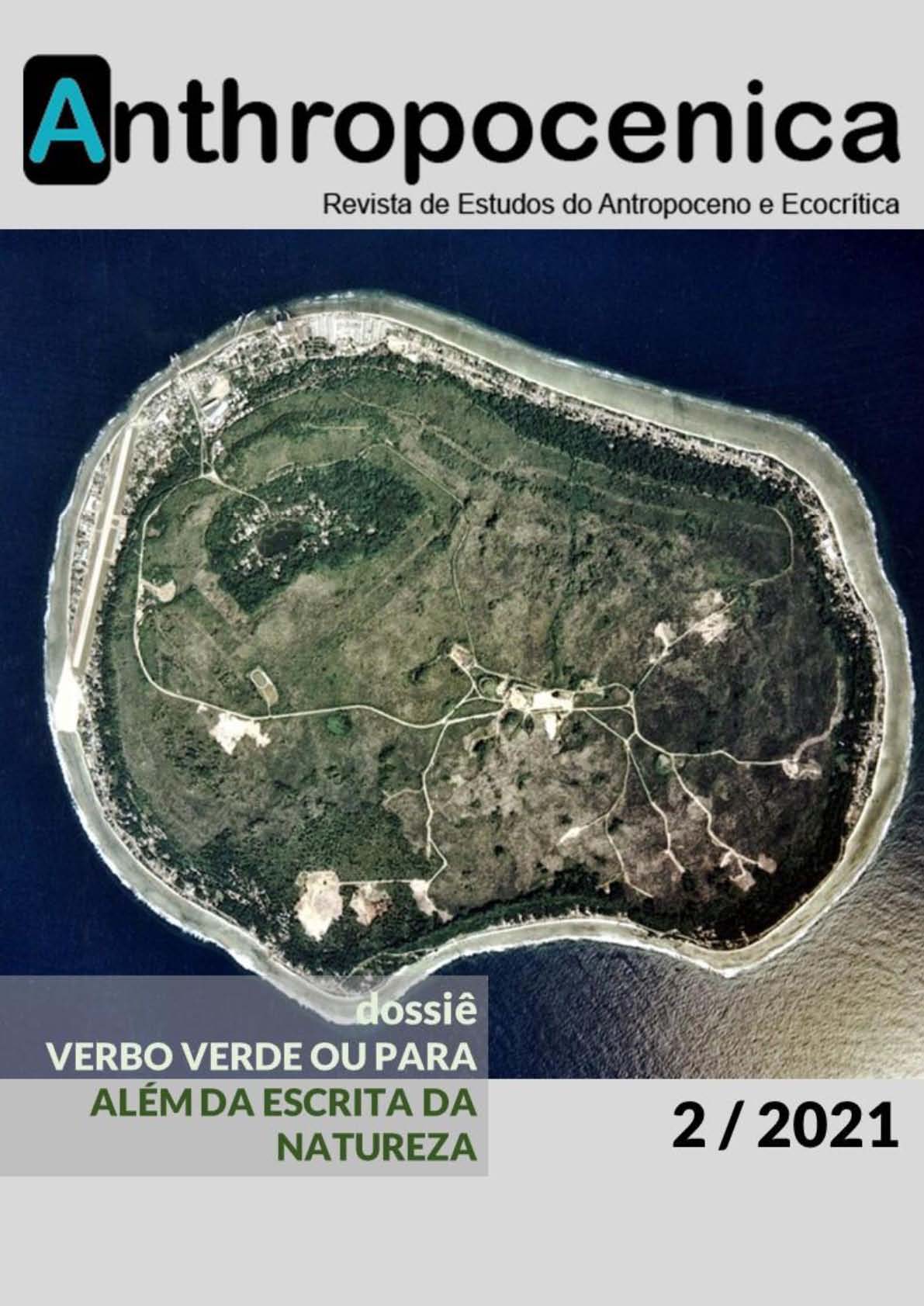Birthplace Revisited – a look at Humanity in Nnedi Okorafor
DOI:
https://doi.org/10.21814/anthropocenica.3656Keywords:
Afrofuturism, AfroSciFi, Utopian Literature, Nigerian Literature, Nnedi OkoraforAbstract
As the ultimate birthplace of Humanity, Africa is fertile ground for writings and rewritings of human history. The tragedies and atrocities in its historical path add to the relevance of reflecting on humankind through Africa. Thus, AfroSciFi is playing a pivotal role in 21st century utopian and dystopian thinking. Nigeria in particular has always been at the forefront of African literature, with remarkable contributions including Chinua Achebe and Chimamanda Ngozi Adichie. The second decade of the 21st century welcomed the work of Nigerian-American Nnedi Okorafor as a cosmo/afropolitan, afrofuturistic voice. All three share a highly politicized type of writing and a stern opposition to reductive, dogmatic readings of the world, and of Africa in particular. In fact, all three, in various ways, embrace a hybrid tradition of western(ized) education applied to African exceptionality and often seasoned by the bitter experience of the oppressed. Rejecting “the single story” and all stereotypes, whether friend or foe, is a constant concern in contemporary African fiction. When Nigeria comes to witness the literary work of young Nnedi Okorafor, the possibilities are almost limitless and bringing together African past and future is both feasible and challenging.
Downloads
References
Adejunmobi, M. (2016). Introduction: African Science Fiction. Cambridge Journal of Postcolonial Literary Inquiry, 3(3), pp. 265-272. DOI: https://doi.org/10.1017/pli.2016.28
Adichie, C. (2009). (TED video). (2009, julho). The Danger of a Single Story. (Video). https://www.ted.com/talks/chimamanda_ngozi_adichie_the_danger_of_a_single_story
Anyangwe, E. (2017, September 18). “So many different types of strange”: how Nnedi Olorafor is changing the face of sci-fi. The Guardian. https://www.theguardian.com/lifeandstyle/2017/sep/18/so-many-different-types-of-strange-how-nnedi-okorafor-is-changing-the-face-of-sci-fi
Aiyetoro, M. & Olaoye, E. (2016). Afro-Science Fiction: a study of Nnedi Okorafor`s What Sunny Saw and Lagoon. Pivot: A Journal of Interdisciplinary Studies & Thought, 5(1), pp. 226-246. DOI: https://doi.org/10.25071/2369-7326.40265
Bould, M. (2013). Africa SF: Introduction. Paradoxa: Studies in World Literary Genres, 25, pp. 7-15.
Burnett, J. (2015). The Great Change and the Great Book: Nnedi Okorafor`s Postcolonial, Post-Apocalyptic Africa and the Promise of Black Speculative Fiction. Research in African Literatures, 46(4), pp. 133-150. DOI: https://doi.org/10.2979/reseafrilite.46.4.133
Cámara, D. (2014). Una poética de la violencia. La prática discursiva en contextos de conflicto extremo en la literatura africana contemporânea (1980-2010). Alicante: Universitat d`Alacant.
Capers, B. (2019). Afrofuturism, critical race theory, and policing in the year 2044. New York University Law Review, 94(1), pp 1-60.
Crowley, D. (2019). Cosmos and Polis: Space and Place in Nnedi Okorafor`s SF. Science Fiction Studies, 46(2), pp. 268-288. DOI: https://doi.org/10.1353/sfs.2019.0058
Cunha, P. (2016). “Direito de dizer tudo”: desafios ao direito & literatura na sociedade da informação. Revista da Faculdade de Direito UFMG, 69, pp. 551-566.
Curry, A. (2014). Traitorousness, Invisibility and Animism: an ecocritical reading of Nnedi Okorafor`s West African novels for children. International Research in Children`s Literature, 7(1), pp. 37-47. DOI: https://doi.org/10.3366/ircl.2014.0112
Dowdall, L. (2013). The Utopian Fantastic in Nnedi Okorafor`s Who Fears Death. Paradoxa: Studies in World Literary Genres, 25, pp. 173-190.
Drage, E. (2019). Utopia/Dystopia, Race, Gender, and new forms of Humanism in women`s science fiction. Bologna: Università di Bologna.
Eze, C. (2016). Preface. In C. Eze (ed.), Ethics and Human Rights in Anglophone African Women`s Literature (pp. 95-119). Chicago: Palgrave MacMillan. DOI: https://doi.org/10.1007/978-3-319-40922-1_4
Hugo, E. (2017). Looking forward, looking back: animating magic, modernity and the African city – future in Nnedi Okorafor`s Lagoon. Social Dynamics, 43(1), pp. 46-58. DOI: https://doi.org/10.1080/02533952.2017.1345528
Ingram, N. (2013). Cultural Conversations: the politics of myth and history in Guy Gavriel Kay`s Under Heaven and Nnedi Okorafor`s Who Fears Death. Okanagan: the University of British Columbia.
Jue, M. (2017). Intimate Objectivity: on Nnedi Okorafor`s Oceanic Afrofuturism. Women`s Studies Quarterly, 45(1/2), pp. 171-88. DOI: https://doi.org/10.1353/wsq.2017.0022
Mackey, A. (2018). Guilty speculations: the Affective Climate of Global Anthropocene Fictions. Science Fiction Studies, 45(3), pp. 530-544. DOI: https://doi.org/10.5621/sciefictstud.45.3.0530
Monk, S. (2019). Intimate Fictions: the rhetorical strategies of obscene violence in four novels. Louisiana: Luisiana State University.
Moonsamy, N. (2016). Life is a Biological Risk: Contagion, Contamination, and Utopia in African Science Fiction. Cambridge Journal of Postcolonial Literary Inquiry, 3(3), pp. 329-343. DOI: https://doi.org/10.1017/pli.2016.16
Okorafor, N. (2015). Writing Rage, Truth and Consequence. Journal of the Fantastic in the Arts, 26(1), pp- 21-26.
Okorafor, N. (2011). Spider the Artist. Lightspeed Magazine, 10. http://www.lightspeedmagazine.com/fiction/spider-the-artist
Okorafor, N. (2010b, June 2). The lessons from my first Who Fears Death`s signing: Africans NEED SF & Fantasy. Nnedi`s Wahala Zone Blog. http://nnedi.blogspot.com/2010/05/lesson-from-my-1st-who-fears-death-book.html
Okorafor, N. (2010a, May 15). The writing of Who Fears Death. Nnedi`s Wahala Zone Blog. http://nnedi.blogspot.com/2010/05/writing-of-who-fears-death.html
Omelsky, M. (2014). “After the End Times”: Postcrisis African Science Fiction. The Cambridge Journal of Postcolonial Literary Inquiry, 1, special issue 1, pp. 33-49. DOI: https://doi.org/10.1017/pli.2013.2
Pahl, M. (2018). Time, Progress, and Multidirectionality in Nnedi Okorafor`s Who Fears Death. Research in African Literatures, 49, pp. 207 - 222. DOI: https://doi.org/10.2979/reseafrilite.49.3.12
Pepetela (2013). O Quase Fim do Mundo. Alfragide: Leya.
Pereira, L. et al (2020). Wakanda Phambili! African science fiction for reimaginating the Anthropocene. In S. Kemp & J. Andersson (eds), Futures: Interdisciplinary Perspectives on Futurity (pp. 261-280). Oxford: OUP. DOI: https://doi.org/10.1093/oxfordhb/9780198806820.013.16
Rahn, J. (2019). (Re-)Negotiating Black Posthumanism – The Precarity of Race in Nnedi Okorafor`s Lagoon. Anglistik: International Journal of English Studies, 30(2), pp. 83-97. DOI: https://doi.org/10.33675/ANGL/2019/2/10




